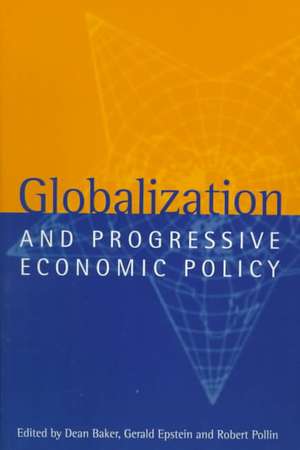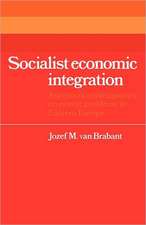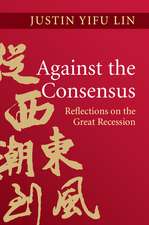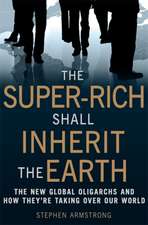Globalization and Progressive Economic Policy
Editat de Dean Baker, Gerald Epstein, Robert Pollinen Limba Engleză Paperback – 4 noi 1998
Preț: 367.14 lei
Nou
Puncte Express: 551
Preț estimativ în valută:
70.26€ • 76.29$ • 59.02£
70.26€ • 76.29$ • 59.02£
Carte tipărită la comandă
Livrare economică 22 aprilie-06 mai
Preluare comenzi: 021 569.72.76
Specificații
ISBN-13: 9780521643764
ISBN-10: 0521643767
Pagini: 532
Ilustrații: 12 b/w illus. 59 tables
Dimensiuni: 153 x 228 x 33 mm
Greutate: 0.84 kg
Editura: Cambridge University Press
Colecția Cambridge University Press
Locul publicării:Cambridge, United Kingdom
ISBN-10: 0521643767
Pagini: 532
Ilustrații: 12 b/w illus. 59 tables
Dimensiuni: 153 x 228 x 33 mm
Greutate: 0.84 kg
Editura: Cambridge University Press
Colecția Cambridge University Press
Locul publicării:Cambridge, United Kingdom
Cuprins
1. Introduction Dean Baker, Gerald Epstein and Robert Pollin; 2. The revival of the liberal creed: the IMF, the World Bank and inequality in a globalized economy Ute Pieper and Lance Taylor; 3. India: dirigisme, structural adjustment and the radical alternative Prabat Patnaik and C. P. Chandrasekhar; 4. Globalisation, transnational corporations, and economic development: can the developing countries pursue strategic industrial policy in a globalising world economy Ha-Joon Chang; 5. Multinational corporations in the neo-liberal regime James Crotty, Gerald Epstein and Patricia Kelly; 6. Implications of globalization for macroeconomic theory and policy in developing countries Amit Bhaduri; 7. Asia and the crisis of financial globalization David Felix; 8. Globalization and financial systems: policies for the new environment Marc Schaberg; 9. Housing finance in the age of globalization: from social housing to life cycle risk Gary Dymski and Dorene Isenberg; 10. Openness and equity: regulating labor market outcomes in a globalized economy Jim Stanford; 11. Integration and income distribution under the North American Free Trade Agreement: the experience of Mexico Mehere Larudee; 12. Malthus redux? Globalization and the environment Eban Goodstein; 13. Freedom to move in the age of globalization Bob Sutcliffe; 14. Immigration, inequality and policy alternatives Greg DeFreitas; 15. Notes on international migration suggested by the Indian experience Prabat Patnaik and C. P. Chandrasekhar; 16. The NAIRU: is it a real constraint Dean Baker; 17. Internal and external constraints on egalitarian policies Andrew Glyn; 18. The effects of globalization on policy formation in South Africa Laurence Harris and Jonathan Michie; 19. Can domestic expansionary policies succeed in a globally integrated environment? A consideration of alternatives Robert Pollin.
Recenzii
'This book on globalisation stands out for its breadth of coverage, the quality of its contents and for the unusual perspectives it provides on the subject. The book shows how to understand the costs and benefits of globalisation and what citizens and governments should do to ensure that economic justice and economic stability are not among its casualties. A 'must-read' for scholars, students and policy-makers.' Ajit Singh, University of Cambridge
'Here is a book that will force you to reconsider much of what you think you know about policy in a globalized economy. Even if you do not agree with the conclusions, you will be enriched for having pondered these unconventional perspectives.' Dani Rodrik, Harvard University
'This book sheds valuable light on understanding the central role international financial liberalisation has played in the recent Asian economic crisis, and on predicting what will be the consequences of the neo-liberal policies the IMF has imposed on Korea, Thailand and Indonesia. More importantly, the book provides many progressive policy ideas to those of us who have been bewildered by the propaganda that 'there is no alternative' to neo-liberalism.' Soo Haeng Kim, Seoul National University
'Amidst the hype and half-truths about globalization, this collection stands out for its richly documented and path-breaking analysis. Destined to become the standard against which future critical analyses of the global economy are judged, this book is ideal for course use and is a must-have for the libraries of all social scientists interested in these critical issues.' Juliet B. Schor, Harvard University
'The editors of and contributors to this compelling new book go far beyond the numbers, to set out and debate big ideas about the history of capitalist development in the twentieth century. Does the present revival of free markets - the neoliberal regime - constitutes a welcome return to the generally benign processes of global integration that preceded World War I? Or does it represent a dangerous undermining of the socially solidaristic embedding of market forces that was the great invention of the post World War II welfare state? As this book shows, the reappearance of all the old problems of political and economic instability and worsening inequality strongly support the second interpretation. Without new forms of state regulation such as those described in this volume, unfettered global capitalism threatens to wreck havoc with balanced, civilized, equitable economic growth.' Bennett Harrison, New School for Social Research
'In this excellent collection, 37 contributors from around the world study the World Bank, the IMF, the multinational corporations, movement of capital, goods and labour and the possibilities of national economic renewal.' Morning Star
'Here is a book that will force you to reconsider much of what you think you know about policy in a globalized economy. Even if you do not agree with the conclusions, you will be enriched for having pondered these unconventional perspectives.' Dani Rodrik, Harvard University
'This book sheds valuable light on understanding the central role international financial liberalisation has played in the recent Asian economic crisis, and on predicting what will be the consequences of the neo-liberal policies the IMF has imposed on Korea, Thailand and Indonesia. More importantly, the book provides many progressive policy ideas to those of us who have been bewildered by the propaganda that 'there is no alternative' to neo-liberalism.' Soo Haeng Kim, Seoul National University
'Amidst the hype and half-truths about globalization, this collection stands out for its richly documented and path-breaking analysis. Destined to become the standard against which future critical analyses of the global economy are judged, this book is ideal for course use and is a must-have for the libraries of all social scientists interested in these critical issues.' Juliet B. Schor, Harvard University
'The editors of and contributors to this compelling new book go far beyond the numbers, to set out and debate big ideas about the history of capitalist development in the twentieth century. Does the present revival of free markets - the neoliberal regime - constitutes a welcome return to the generally benign processes of global integration that preceded World War I? Or does it represent a dangerous undermining of the socially solidaristic embedding of market forces that was the great invention of the post World War II welfare state? As this book shows, the reappearance of all the old problems of political and economic instability and worsening inequality strongly support the second interpretation. Without new forms of state regulation such as those described in this volume, unfettered global capitalism threatens to wreck havoc with balanced, civilized, equitable economic growth.' Bennett Harrison, New School for Social Research
'In this excellent collection, 37 contributors from around the world study the World Bank, the IMF, the multinational corporations, movement of capital, goods and labour and the possibilities of national economic renewal.' Morning Star
Descriere
Prominent economists analyze the impact of the emerging global economy on national sovereignty and standards of living.














